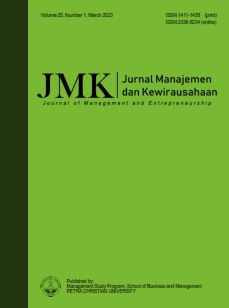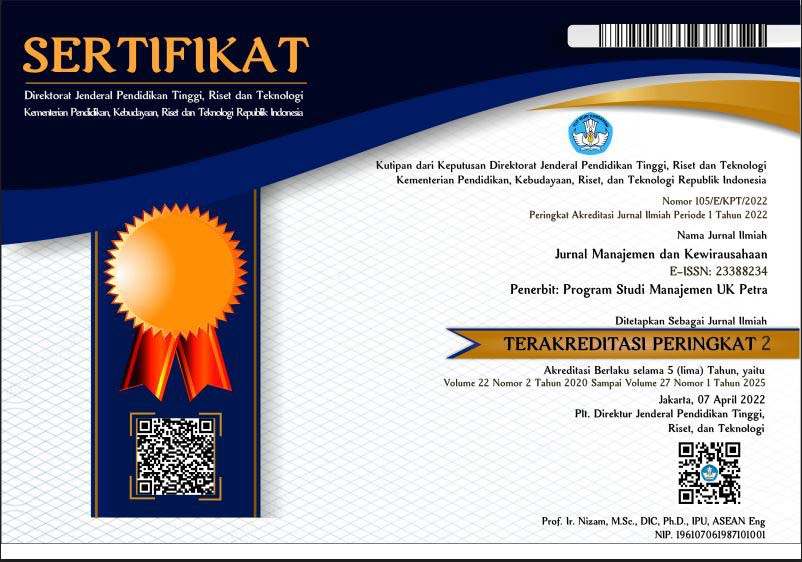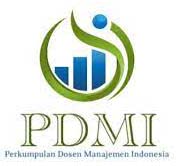STAKEHOLDERS’ ATTITUDE TOWARD ECOTOURISM DEVELOPMENT IN RINJANI-LOMBOK GEOPARK: THE EVIDENCE FROM MOUNT RINJANI NATIONAL PARK
 :
:
https://doi.org/10.9744/jmk.25.1.41-54
Abstract
Based on stakeholder and social exchange theory, this study examined a model of the relationship between stakeholder awareness, perception of impact (environmental, economic, and socio-cultural), and attitude toward ecotourism development in Mount Rinjani National Park (MRNP). The model was tested using a sample of 157 stakeholders. Data were collected by surveying and analyzing using the partial least squares. The results showed that only perception of the economic impacts of ecotourism partially mediated the relationship between awareness and attitude toward ecotourism development. From the perspective of stakeholder theory, the perceived impacts are heterogeneous. These differences will determine their attitude toward the level of support and participation. From the perspective of social exchange theory, the study showed that attitude toward ecotourism development is directly influenced by awareness of ecotourism and the perception of economic impact. The stakeholders on MRNT have a more compromising attitude toward ecotourism development to the socio-cultural and environmental impacts.
References
Abdillah, W., & Hartono, J (2015). Partial least square (PLS), alternatif structural equation modeling (SEM) dalam penelitian bisnis. Yogyakarta: Penerbit Andi.
Adiakurnia, M. I. (2018). Rinjani akan semakin mendunia setelah jadi geopark. Kompas On¬line. https://travel.kompas.com/read/2018/0 4/17/163 000227/rinjani-akan-semakin-mendunia-setelah-jadi-geopark
Akbaba, A. (2012). Business performance of small tourism enterprises: A comparison among three sub-sectors of the industry. Anatolia, 23(2), 177–195. https://doi.org/10.1080/13032917.2012.662907
Ali, F., Rasoolimanesh, S. M., Sarstedt, M., Ringle, C. M. & Ryu, K. (2018). An assessment of the use of partial least squares structural equation modeling (PLS-SEM) in hospitality research. International Journal of Contemporary Hospitality Management, 30(1), 514–538. https://doi.org/10.1108/IJCH M-10-2016-0568
Almeida-García, F., Peláez-Fernández, M. Á., Balbuena-Vázquez, A. & Cortés-Macias, R. (2016). Residents’ perceptions of tourism development in Benalmádena (Spain). Tourism Management, 54, 259–274. https://doi.org/10.1016/j.tourman.2015.11.007
Ap, J. (1992). Residents’ perceptions on tourism impacts. Annals of Tourism Research, 19(4), 665–690. https://doi.org/10.1016/01607383(92)90060-3
BPS. (2018). Kecamatan Bayan dalam angka. Badan Pusat Statistik Kabupaten Lombok Utara.
BTNGR. (2020). Laporan tahunan. Balai Taman Nasional Rinjani.
Byrd, E. T., Bosley, H. E., & Dronberger, M. G. (2009). Comparisons of stakeholder perceptions of tourism impacts in rural eastern North Carolina. Tourism Management, 30(5), 693–703. https://doi.org/10.1016/j.tourman.2008.10.021
Byrd, E. T., Cárdenas, D. A. & Greenwood, J. B. (2008). Factors of stakeholder understanding of tourism: The case of Eastern North Carolina. Tourism and Hospitality Research, 8(3), 192–204. https://doi.org/10.1057/thr.2008.21
Cañizares, S. M. S., Canalejo, A. M. C., & Tabales, J. M. N. (2016). Stakeholders’ perceptions of tourism development in Cape Verde, Africa. Current Issues in Tourism, 19(10), 966–980. https://doi.org/10.1080/13683500.2015.1008428
Chen, C. F., & Chen, P. C. (2010). Resident Attitude toward heritahe tourism development. Tourism Geographies, 12(4), 525–545. https://doi.org/10.1080/14616688.2010.516398
Cooper, D. R., & Schindler, P. S. (2013). Business research methods. Twelveth Edition. McGraw-Hill International Edition.
Coulson, A. B., MacLaren, A. C., McKenzie, S. & O’Gorman, K. D. (2014). Hospitality codes and social exchange theory: The Pash-tunwali and tourism in Afghanistan. Tourism Management, 45, 134–141. https://doi.org/10.1016/j.tourman. 2014.03.019
den Braber, B., Evans, K. L. & Oldekop, J. A. (2018). Impact of protected areas on poverty, extreme poverty, and inequality in Nepal. Conservation Letters, 11(6), 1–9. https://doi.org/10.1111/conl.12576
Diedrich, A., & García-Buades, E. (2009). Local perceptions of tourism as indicators of destination decline. Tourism Management, 30(4), 512–521. https://doi.org/10.1016/j.tourman. 2008.10.009
Dimitrovski, D., Lemmetyinen, A., Nieminen, L. & Pohjola, T. (2021). Understanding coastal and marine tourism sustainability - A multi-stake-holder analysis. Journal of Destination Marketing and Management, 19, 100554. https://doi.org/10.1016/j.jdmm.2021.100554
Eslami, S., Khalifah, Z., Mardani, A., Streimikiene, D. & Han, H. (2019). Community attachment, tourism impacts, quality of life and residents’ support for sustainable tourism development. Journal of Travel and Tourism Marketing, 36(9), 1061–1079. https://doi.org/10.1080/10548408. 2019.1689224
Farrell, B. H., & Twining-Ward, L. (2004). Reconceptualizing tourism. Annals of Tourism Research, 31(2), 274–295. https://doi.org/10.1016/ j.annals.2003.12.002
Firinguetti, L., Kibria, G., & Araya, R. (2017). Study of partial least squares and ridge regression methods. Communications in Statistics: Simulation and Computation, 46(8), 6631–6644. https://doi.org/10.1080/03610918.2016.1210168
Freeman, R. E., Phillips, R. & Sisodia, R. (2020). Tensions in stakeholder theory. Business and Society, 59(2), 213–231. https://doi.org/10.1177/0007650318773750
Ghozali, I. (2008). Structural equation modeling: Metode alternatif dengan partial least square. Second Edition. Semarang: Badan Penerbit Universitas Diponegoro.
Grönroos, C. (2006). On defining marketing: Finding a new roadmap for marketing. Marketing Theory, 6(4), 395–417. https://doi.org/10.1177/147059 3106069930
Gursoy, D., Chi, C. G., & Dyer, P. (2010). Locals’ attitudes toward mass and alternative tourism: The case of Sunshine Coast, Australia. Journal of Travel Research, 49(3), 381–394. https://doi.org/10.1177/0047287509346853
Gursoy, D., Ouyang, Z., Nunkoo, R. & Wei, W. (2019). Residents’ impact perceptions of and attitudes towards tourism development: A meta-analysis. Journal of Hospitality Marketing and Management, 28(3), 306–333. https://doi.org/10.1080/19368623.2018.1516589
Hair, J. F., Black, W. C., Babin, B. J., & Anderson, R. E. (2018). Multivariate data analysis. Eighth Edition. Cengage India.
Hair, J. F., Matthews, L. M., Matthews, R. L., & Sarstedt, M. (2017). PLS-SEM or CB-SEM: Updated guidelines on which method to use. International Journal of Multivariate Data Analysis, 1(2), 107–123. https://doi.org/10.1504/ijmda.2017.087624
Hair, J. F., Risher, J. J., Sarstedt, M., & Ringle, C. M. (2019). When to use and how to report the results of PLS-SEM. European Business Review, 31(1), 2–24. https://doi.org/10.1108/EBR-11-2018-0203
Hultman, M., Kazeminia, A. & Ghasemi, V. (2015). Intention to visit and willingness to pay premium for ecotourism: The impact of attitude, materialism, and motivation. Journal of Business Research, 68(9), 1854–1861. https://doi.org/10.1016/j.jbusres.2015.01.013
Jurowski, C., Uysal, M. & Williams, D. R. (1997). A theoretical analysis of host community resident reactions to tourism. Journal of Travel Research, 36(2), 3–11. https://doi.org/10.1177/004728759703600202
Kock, N., & Hadaya, P. (2018). Minimum sample size estimation in PLS-SEM: The inverse square root and gamma-exponential methods. Information Systems Journal, 28(1), 227–261. https://doi.org/10.1111/isj.12131
Kuvan, Y., & Akan, P. (2012). Conflict and agreement in stakeholder attitudes: Residents’ and hotel managers’ views of tourism impacts and forest-related tourism development. Journal of Sustain-able Tourism, 20(4), 571–584. https://doi.org/10.1080/09669582.2011.617824
Lee, T. H. (2013). Influence analysis of community resident support for sustainable tourism development. Tourism Management, 34, 37–46. https://doi.org/10.1016/j.tourman.2012.03.007
Lee, T. H., & Jan, F. H. (2019). Can community-based tourism contribute to sustainable development? Evidence from residents’ perceptions of the sustainability. Tourism Management, 70, 368–380. https://doi.org/10.1016/j.tourman.2018.09.003
Lenao, M. & Basupi, B. (2016). Ecotourism development and female empowerment in Botswana: A review. Tourism Management Perspectives, 18, 51–58. https://doi.org/10.1016/j.tmp.2015.12.021
MacKinnon, D. P., Fairchild, A. J., & Fritz, M. S. (2007). Mediation analysis. Annual Review of Psychology, 58, 593–614. https://doi.org/10.1146/annurev.psych.58.110405.085542
McGehee, N. G., Meng, F. & Tepanon, Y. (2006). Understanding legislators and their perceptions of the tourism industry: The case of North Carolina, USA, 1990 and 2003. Tourism Management, 27(4), 684–694. https://doi.org/10.1016/j.tourman.2005.02.008
Myers, D., & Twenge, J. M. (2018). Social psychology. Thirteenth Edition. McGraw Hill.
Myers, R. & Muhajir, M. (2015). Searching for Justice: Rights vs “Benefits” in Bukit Baka Bukit Raya National Park, Indonesia. Conservation and Society, 13(4), 370–381. https://doi.org/10.4103/0972-4923.179886
Nugroho, P., & Numata, S. (2022). Resident support of community-based tourism development: Evidence from Gunung Ciremai National Park, Indonesia. Journal of Sustainable Tourism, 30(11), 2510–2525. https://doi.org/10.1080/09 669582.2020.1755675
Nunkoo, R. (2016). Toward a more comprehensive use of social exchange theory to study residents’ attitudes to tourism. Procedia Economics and Finance, 39, 588–596. https://doi.org/10.1016/s2212-5671(16)30303-3
Nunkoo, R. & Ramkissoon, H. (2011). Developing a community support model for tourism. Annals of Tourism Research, 38(3), 964–988. https://doi.org/10.1016/j.annals.2011.0 1.017
Nurhanifa, E., Konety, N., & Affandi, R. (2020). Diplomasi publik baru Indonesia terhadap UNESCO dalam menjadikan kawasan Geopark Rinjani-Lombok sebagai geopark global UNES¬CO. Padjadjaran Journal of International Relations, 1(3), 240–250. https://doi.org/10.24198/padjir.v1i3.26195
Nurrochmat, D. R., Nugroho, I. A., Hardjanto, Purwadianto, A., Maryudi, A. & Erbaugh, J. T. (2017). Shifting contestation into cooperation: Strategy to incorporate different interest of actors in medicinal plants in Meru Betiri National Park, Indonesia. Forest Policy and Economics, 83, 162–168. https://doi.org/10.1016/j.forpol.2017.08.005
Paul, J., Modi, A. & Patel, J. (2016). Predicting green product consumption using theory of planned behavior and reasoned action. Journal of Retailing and Consumer Services, 29, 123–134. https://doi.org/10.1016/j.jretconse r.2015.11.006
Pham, H. S. T., & Khanh, C. N. T. (2021). Ecotourism intention: The roles of environmental concern, time perspective and destination image. Tourism Review, 76(5), 1141–1153. https://doi.org/10.1108/TR-09-2019-0363
Poria, Y., Reichel, A. & Cohen, R. (2013). Tourists perceptions of world heritage site and its designation. Tourism Management, 35, 272–274. https://doi.org/10.1016/j.tourman.2012.02.011
Prayag, G., Hosany, S., Nunkoo, R. & Alders, T. (2013). London residents’ support for the 2012 olympic games: The mediating effect ofoverall attitude. Tourism Management, 36, 629–640. https://doi.org/10.1016/j.tourman.2012.08.003
Qin, X., Shen, H., Ye, S. & Zhou, L. (2021). Revisiting residents’ support for tourism development: The role of tolerance. Journal of Hospitality and Tourism Management, 47, 114–123. https://doi.org/10.1016/j.jhtm.2021.02.010
Rasoolimanesh, S. M., & Seyfi, S. (2021). Residents’ perceptions and attitudes towards tourism development: A perspective article. Tour¬ism Review, 76(1), 51–57. https://doi.org/10.1108/TR-11-2019-0461
Rigdon, E. E., Sarstedt, M. & Ringle, C. M. (2017). On comparing results from CB-SEM and PLS-SEM: Five perspectives and five recommendations. Marketing ZFP, 39(3), 4–16. https://doi.org/10.15358/0344-1369-2017-3-4
Robbins, S. P. & Judge, T. A. (2018). Organizational behavior. Fourteenth Edition. Pearson.
Roloff, M. E. (1981). Interpersonal communication: The social exchange approach. Sage Publication Inc.
Sarstedt, M., Hair, J. F., Ringle, C. M., Thiele, K. O., & Gudergan, S. P. (2016). Estimation issues with PLS and CBSEM: Where the bias lies! Journal of Business Research, 69(10), 3998–4010. https://doi.org/10.1016/j.jbusres.2016.06.007
Sekaran, U., & Bougie, R. (2016). Research methods for business: A skill-building approach. Seventh Edition. Wiley.
Severin, W. J., & Tankard Jr, J. W. (2013). Communication theories: Origins, methods, and uses in the mass media. Sixth Edition. Pearson.
Shi, S., Gursoy, D. & Chen, L. (2019). Conceptualizing home-sharing lodging experience and its impact on destination image perception: A mixed method approach. Tourism Management, 75, 245–256. https://doi.org/10.1016/j.tourman.2019.05.012
Stoddard, J. E., Pollard, C. E., & Evans, M. R. (2012). The triple bottom line: A framework for sustainable tourism development. International Journal of Hospitality and Tourism Administration, 13(3), 233–258. https://doi.org/10.1080/15256480.2012.698173
Stylidis, D., & Terzidou, M. (2014). Tourism and the economic crisis in Kavala, Greece. Annals of Tourism Research, 44(1), 210–226. https://doi.org/10.1016/j.annals.2013.10.004
Su, L., Swanson, S. R., & Chen, X. (2016). The effects of perceived service quality on repurchase intentions and subjective well-being of Chinese tourists: The mediating role of relationship quality. Tourism Management, 52, 82–95. https://doi.org/10.1016/j.tourma n.2015.06.012
Tabaeeian, R. A., Yazdi, A., Mokhtari, N. & Khoshfetrat, A. (2022). Host-tourist interaction, revisit intention and memorable tourism experience through relationship quality and perceived service quality in ecotourism. Journal of Ecotourism, 1–24. https://doi.org/10.1080/14724049.2022.2046759
Tim-Media-Center. (2023). Global Geopark Rinjani & manfaatnya bagi masyarakat. Retrieved from https://www.ntbprov.go.id/post/ program-unggulan/global-geopark-rinjani-manfaatnya-bagi-masyarakat
UNWTO. (2023). Sustainable development. https: //www.unwto.org/sustainable-development
van Niekerk, M., & Saayman, M. (2013). The influences of tourism awareness on the travel patterns and career choices of high school students in South Africa. Tourism Review, 68(4), 19–33. https://doi.org/10.1108/TR-0 9-2013-0049
Vargas-Sánchez, A., Oom do Valle, P., da Costa Mendes, J. & Silva, J. A. (2015). Residents’ attitude and level of destination development: An international comparison. Tourism Management, 48, 199–210. https://doi.org/10.1016/j.tourman.2014.11.005
Wang, Q., Dou, J. & Jia, S. (2016). A meta-analytic review of corporate social responsibility and corporate financial performance: The moderating effect of contextual factors. Business and Society, 55(8), 1083–1121. https://doi.org/10.1177/0007650315584317
West, R., & Turner, L. (2017). Introducing communication theory: Analysis and application. Sixth Edition. McGraw-Hill.
Wu, A. D., & Zumbo, B. D. (2008). Under-standing and using mediators and moderators. Social Indicators Research, 87, 367–392. https://doi.org/10.1007/s11205-007-9143-1
Yergeau, M. E., Boccanfuso, D. & Goyette, J. (2017). Linking conservation and welfare: A theoretical model with application to Nepal. Journal of Environmental Economics and Management, 85, 95–109. https://doi.org/10.1016/j.jeem.2017.05.003
Yoon, S. E. A. & Lee, K. (2021). The effect of eco-tourism knowledge on residents’ attitudes in Otavalo, Ecuador: The knowledge theory of attitude–behavior consistency. Journal of Hospitality and Tourism Insights, 6(1), 174–190. https://doi.org/10.1108/JHTI -06-2021-0148
Yusran, Y., Sahide, M. A. K., Supratman, S., Sa¬bar, A., Krott, M. & Giessen, L. (2017). The empirical visibility of land use conflicts: From latent to manifest conflict through law enforcement in a national park in Indonesia. Land Use Policy, 62, 302–315. https://doi.org/10.1016/j.landusepol.2016.12.033
Zikmund, W. G., & Babin, B. J. (2016). Exploring marketing research. Eleventh Edition. Cengage.
Downloads
Published
How to Cite
Issue
Section
License
Authors who publish on this journal agree to the following terms:
- Authors retain copyright and grant the journal right of first publication with the work simultaneously licensed under a Creative Commons Attribution License that allows others to share the work with an acknowledgement of the work's authorship and initial publication in this journal.
- Authors are able to enter into separate, additional contractual arrangements for the non-exclusive distribution of the journal's published version of the work (e.g., post it to an institutional repository or publish it in a book), with an acknowledgement of its initial publication in this journal.
- Authors are permitted and encouraged to post their work online (e.g., in institutional repositories or on their website) prior to and during the submission process, as it can lead to productive exchanges, as well as earlier and greater citation of published work (See The Effect of Open Access).


















